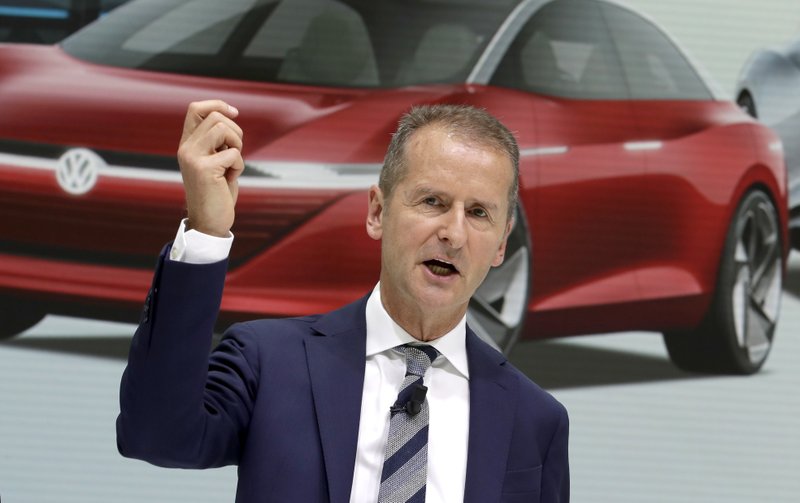BERLIN -- German prosecutors dealt a blow to Volkswagen's efforts to put the 2015 emissions-cheating case behind it, charging the automaker's chief executive, chairman and former CEO with stock manipulation for not telling investors at the time that the scandal was about to break.
Chief Executive Officer Herbert Diess, Chairman Hans Dieter Poetsch and former CEO Martin Winterkorn were accused of deliberately informing markets too late about the costs to VW that would result from the scandal, which came to light when regulators discovered that millions of diesel cars had been fitted with software designed to thwart pollution tests.
Winterkorn was previously charged in the scandal itself. Poetsch and Diess had not faced charges until now.
Volkswagen called the new allegations "groundless" and threw its support behind Poetsch and Diess. But the case could require Diess to spend time on his defense at a crucial time for the company.
Just days ago, Diess stood on stage at the Frankfurt Motor Show with the company's new battery-powered vehicle, the ID.3, and showed off a new version of the VW logo to underscore the automaker's transformation.
The new car is aimed at bringing zero-emissions driving to the masses. The vehicle is supposed to be carbon-dioxide neutral throughout its production chain.
Prosecutors said Winterkorn knew of the impending scandal and the potential financial damage since at least May 2015, Poetsch since late June of that year, and Diess since late July, less than a month after he became head of the company's VW brand.
The scandal broke when the U.S. Environmental Protection Agency went public with its findings in mid-September 2015. That led to a drop in the automaker's stock.
The charges could bring up to five years in prison, authorities said.
Winterkorn resigned shortly after the scandal broke. Poetsch was chief financial officer at the time and became chairman in late 2015. Winterkorn was succeeded as CEO by Matthias Mueller, who was then replaced by Diess in April 2018.
Volkswagen's board said that based on expert legal advice, it had anticipated a negotiated settlement with the EPA and did not expect the agency to announce a violation. VW said that before the EPA announcement, "management had no concrete evidence that would have made immediate notification of the capital markets necessary."
Volkswagen stock fell 2% on Tuesday.
Volkswagen admitted installing software that turned on pollution controls when vehicles were being tested and switched them off during everyday driving. That made it look as if the cars met tough U.S. limits on pollutants known as nitrogen oxides.
In all, some 11 million cars worldwide were equipped with the illegal software.
The scandal has cost Volkswagen more than $33 billion in fines, recall costs and civil settlements. The automaker apologized and pleaded guilty in the U.S., where two executives were sentenced to prison and six others, including Winterkorn, were charged, though they could not be extradited.
Separately, German prosecutors in April charged Winterkorn and four others with fraud in the emissions scandal. Prosecutors alleged that Winterkorn knew about the software since at least May 2015. Legal proceedings are still going on.
Meanwhile, U.S. prosecutors in Detroit on Tuesday unsealed criminal charges in an investigation of Fiat Chrysler diesel vehicles, accusing an engineer of cheating on pollution tests to get approval from U.S. and California regulators to sell more than 100,000 pickups and SUVs.
The alleged scheme is not as large as the Volkswagen diesel emission scandal, which involved nearly 600,000 vehicles. But the indictment shows that investigators still are on the case, months after Fiat Chrysler agreed to a $650 million civil settlement and said it would fix Jeep Grand Cherokees and Ram 1500 trucks with diesel engines made between 2014 and 2016.
Emanuele Palma, who was a Detroit-area engineer with a Fiat Chrysler engine subsidiary, was charged with conspiracy, violations of the federal Clean Air Act, wire fraud and making false statements. The indictment says he manipulated software to make the pollution control system perform differently under government tests than during regular driving.
Palma and others "purposely calibrated" the control systems to produce less nitrogen oxide during tests, the indictment says.
Information for this article was contributed by Ed White and Tom Krisher of The Associated Press.
Business on 09/25/2019
